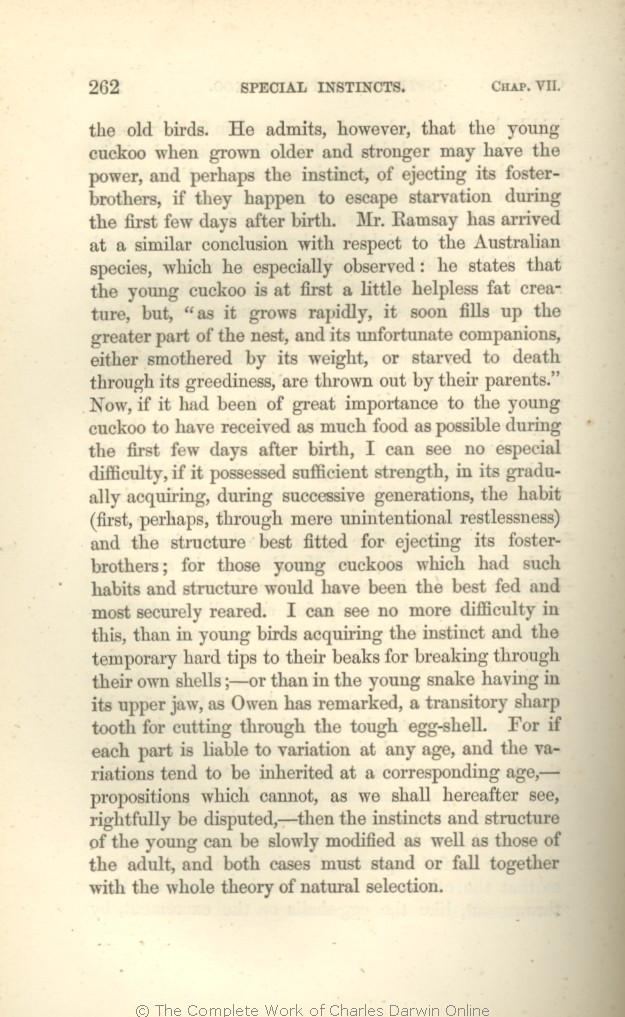birds. He admits, however, that the young cuckoo when grown older and stronger may have the
power,
and perhaps the instinct, of ejecting its foster-brothers, if they happen to escape starvation during the first few days after birth. Mr. Ramsay has arrived at
a similar conclusion with respect to | a similar conclusion with respect to 1866 |
| the same conclusion regarding 1869 |
| species, 1866 | | species: 1869 |
| especially observed: he 1866 |
| OMIT 1869 |
| parents." 1866 |
| parents." Nevertheless there is so much evidence, both ancient and recent, that the young European cuckoo does eject its foster-brothers, that this can hardly be doubted. 1869 |
| Now, if it had been of great importance 1866 |
| Now, if it were of great importance 1869 |
| With respect 1872 |
| young cuckoo to have received as much food as possible during the first few days after birth, I can see no especial difficulty, 1866 |
| young cuckoo to receive as much food as possible soon after birth, I can see no special difficulty 1869 |
| means by which this strange and odious instinct was acquired, 1872 |
| if it possessed sufficient strength, 1866 |
| if it were of great importance for the young cuckoo, as is probably the case, to receive as much food as possible soon after birth, I can see no special difficulty 1872 |
| OMIT 1869 |
| gradually 1866 1869 | | having gradually 1872 |
| acquiring, 1866 | | acquiring 1869 | | acquired, 1872 |
| habit (first, perhaps, through mere unintentional restlessness) and the structure best fitted for ejecting its foster-brothers; 1866 |
| habit (perhaps through mere unintentional restlessness) the strength and the structure best fitted for ejecting its foster-brothers; 1869 |
| blind desire, the strength, and structure necessary for the work of ejection; 1872 |
| would have been the best fed and 1866 |
| would be the best fed and 1869 |
| best developed would be the 1872 |
| 1 blocks not present in 1859 1860 1861 1866 1869; present in 1872 | | The first step towards the acquisition of the proper instinct might have been mere unintentional restlessness on the part of the young bird, when somewhat advanced in age and strength; the habit having been afterwards improved, and transmitted to an earlier age.
|
| young 1866 1869 |
| the unhatched young of other 1872 |
| and the temporary hard tips to their beaks for breaking 1866 1869 |
| to break 1872 |
| or than in the 1866 |
| or than in 1869 1872 |
| snake 1866 | | snakes 1869 1872 |
| having 1866 1869 | | acquiring 1872 |
| variation at any 1866 |
| individual variations at any 1869 |
| individual variations at all 1872 |
| age,— propositions 1866 1869 |
| or earlier age,— propositions 1872 |
| cannot, 1866 | | cannot 1869 1872 |
| as we shall hereafter see, rightfully 1866 |
| OMIT 1869 1872 |
| disputed,— 1866 1872 |
| disputed, — then 1869 |
| the instincts 1866 1872 | | instincts 1869 |
| well 1866 1869 | | surely 1872 |
| adult, 1866 | | adult; 1869 1872 |
| together 1866 1872 | together 1869 |
|









